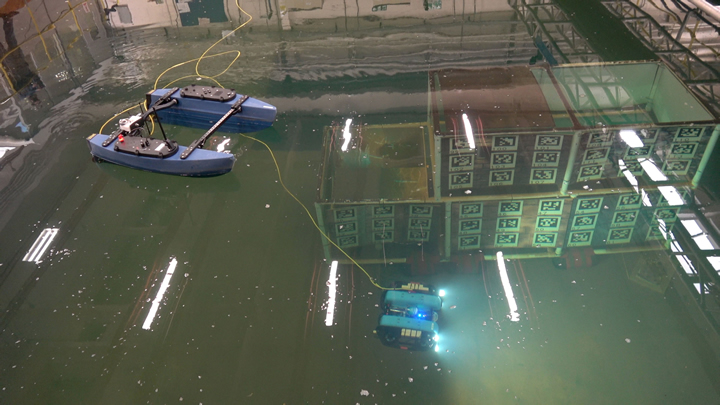AI to enable autonomous underwater robots to perform precision offshore wind farm repairs

The National Robotarium is supporting the development of new artificial intelligence and control systems that could allow underwater robots to operate autonomously and with high precision in turbulent seas, potentially revolutionising maintenance and repair tasks for offshore wind turbines.
The innovative technology is currently undergoing trials as part of the UNITE project, an EPSRC Prosperity Partnership programme led by Heriot-Watt University in collaboration with Imperial College London, geo-data specialist Fugro and underwater software development expert Frontier Robotics, and supported by the National Robotarium, the UK’s centre for robotics and AI.
The project’s technological advancements could dramatically reduce the need for large maintenance vessels in offshore wind farm operations, supporting a shift towards fully remote operations and significantly enhancing safety by reducing the need for personnel to work in hazardous offshore environments.
David Morrison, Project Manager at the National Robotarium, the UK’s centre for robotics and AI, said: “Our trials are showing promising results in enabling underwater robots to maintain stable contact with offshore structures in challenging conditions. If successful, the technology could transform offshore wind maintenance, potentially reducing fuel consumption of maintenance missions by up to 97% - from 7,000 litres per day to just 200 litres. This could significantly lower both operational costs and the carbon footprint of maintenance.”
Yvan Petillot, Professor of Robotics at Heriot Watt University and National Robotarium academic co-lead, said: “The UNITE project was co-created with Fugro to develop the next generation of autonomy-enabled robotics solutions for offshore inspection and maintenance. We are especially interested in subsea inspection and manipulation in dynamic environments where existing solutions cannot be used.”
It is hoped that autonomous underwater robots could perform a wide range of essential maintenance tasks on offshore wind turbines, including taking precise measurements, conducting visual inspections, cleaning structures, and repairing identified defects.
To achieve this level of autonomous operation, the project aims to solve the “chicken head problem” - keeping a robot's arm or tool steady against a structure despite being buffeted by currents and waves. To meet this challenge, advanced control systems and machine learning algorithms are being developed to allow robots to adapt in real-time to changing conditions.
Additionally, the project is advancing 3D semantic mapping capabilities, enabling robots to create detailed maps of their underwater environment. This could enhance a robot’s ability to navigate complex structures and identify components needing attention.
Furthermore, the partnership is advancing the coordination of Remotely Operated Vehicles (ROVs) and Electric ROVs (eROVs) deployed from Uncrewed Surface Vessels (USVs). This coordination is important for achieving fully autonomous inspections and further reducing the need for support vessels and human divers.
The UK has more than 2,600 offshore wind turbines, with plans to quadruple capacity by 2030. On average, each turbine requires up to three maintenance check-ups per year, a frequency that increases as turbines age.
Mark Bruce, Global Product Manager of Next Generation ROV Systems at Fugro, said: “After a career working in harsh offshore environments, I'm proud of what Fugro has achieved. Our USVs and eROV's deliver unmatched efficiency, hugely reduced environmental impact, and most importantly they eliminate human risk offshore by removing people from harm's way. Our remote operations centres have been operating for ten years, during which time we have refined and improved our solutions.”
Frontier Robotics, based at the National Robotarium, is providing state-of-the-art perception, mapping and autonomy technologies for the project, integrating advanced stereo camera systems with edge computing to support the AI systems being tested.
If successful, the system could deliver data insights in just 3 hours, compared to the current industry standard of 3 weeks - a potential 1500-fold improvement in speed.
Jonatan Scharff Willners, CEO of Frontier Robotics, said: “With the exponential growth of offshore infrastructure, we need to look towards deploying more AI, robots and autonomy to enable the industry to take advantage of new technologies to work even more efficiently and to scale with the global demand. It is great to work closely with Heriot-Watt University, the National Robotarium and Fugro to tackle these highly important problems, which are key components if we want to transition to renewable energy using a greener and more sustainable supply-chain.”
Heriot-Watt University spinout Frontier Robotics is one of several startups incubated at the National Robotarium, taking advantage of the facility's world-class resources to accelerate its growth. The National Robotarium offers business acceleration and incubation support to start-up tech companies, spin-outs and SMEs, providing access to office space, labs, equipment, and engineering expertise. It also acts as a gateway to the Scottish and UK robotics network, research funding, and Government support, enabling companies like Frontier Robotics to rapidly develop and commercialise their innovations.
The £1.4 million Underwater Intervention for Offshore Renewable Energies (UNITE) project, led by Professor Yvan Petillot from Heriot-Watt University with Dr. Sen Wang leading Imperial College London's contributions, is funded through an EPSRC Prosperity Partnership, part of UK Research and Innovation.
Energy companies interested in following the development of this technology or exploring potential collaborations are encouraged to contact the National Robotarium.
About the National Robotarium
The National Robotarium is a world-leading centre in robotics and AI, based at Heriot-Watt University’s Edinburgh campus.
Creating innovative solutions to global challenges, the National Robotarium works directly with industry to research, test and develop robotic, AI and automated technologies that have a positive impact on the economy and society.
The National Robotarium is a Data-Driven Innovation hub, funded in partnership with The University of Edinburgh as part of the £1.5bn Edinburgh and South-East Scotland City Region Deal. The Deal is supported with £300m funding from the UK Government and £300m funding from the Scottish Government.
For more information: https://thenationalrobotarium.com
Comments (0)
This post does not have any comments. Be the first to leave a comment below.
Featured Product

